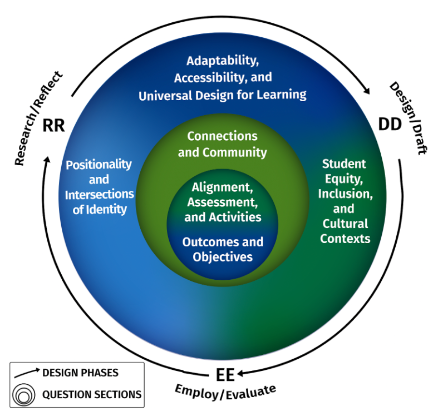Instructional designers at Western promote ADEI-AR tool in recent publication

Justina Brown (Center for Instructional Innovation and Assessment/CIIA & ATUS) and colleagues Andrew Blick, Lauren Nicandri, and Lee Posthumus (Outreach and Continuing Education/OCE & WesternOnline), recently published a book chapter on how they developed the "Heuristic for Inclusive Instructional Design." The chapter, appearing in the Handbook of research on innovative frameworks and inclusive models for online learning (2023), is now accessible as an e-book in Western Libraries.
Over the last few years, this collaborative group of instructional design professionals known as the Teaching and Learning Cooperative, created the Heuristic as a tool to guide faculty and instructional designers toward questions centering inclusive design practices in courses. According to the TLCo-op website:
"Intentional prompts facilitate critical thinking and reflection on one’s own disciplinary roots, course content, materials, and activities... [and] seek to center accessibility, diversity, equity, inclusivity, and anti-racism (ADEI-AR) in relation to a more holistic method for instructional design. Engaging in reflective practices outside of traditional instructional design models may assist faculty and course developers with building student-centered courses where learners benefit from accessible materials, inclusive environments, clear expectations, multiple means of assessment, and broader representation of identities and opportunities in the curriculum. When students have a better sense of motivation, engagement, and belonging, the stage is set for learning and growth."
The creators of the Heuristic do not take full credit for the work. It is, and continues to be, in its own cycle of development, getting input from faculty who use it during the TLCo-op Workshops, the TLCo-op faculty mentors, key University stakeholders, and others engaged in this work. It builds on traditional models and rather than acting as a replacement, it is meant to complement those models and encourage course design that "values and welcomes different perspectives and identities."
For more information, please see the TLCo-op's page and chapter publication information: https://tlc.wwu.edu/hiid/